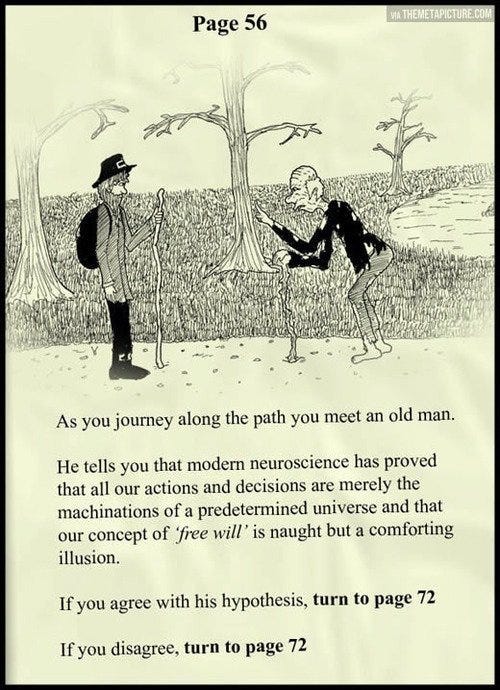The Problem of Free Will, Part 2: Determined to Be Free
Can free will and determinism co-exist?

This is the second part of my three-part series on free will and whether we have it. You can access the first installment here.
In Part 1, we explored the two main traditional solutions to the problem of free will: libertarianism and determinism. In this part, we’ll look at a third option - compatibilism - and then I’ll outline my own solution to the problem. Along the way, we’ll ask:
Is compatibilism just a dodge by people who’ve abandoned free will but won’t admit it?
Does freedom really require an escape from determinism - or might it instead depend on determinism?
Do the famous Libet experiments really show that our conscious mental states have no impact on our behavior, thereby undermining free will?
Is the free will debate just a semantic tangle rather than a substantive disagreement?
If you’ve ever wondered whether you’re a free agent or just a very complicated robot - or whether a very complicated robot could have free will - this post might help you make up your mind!
The Compatibilist Solution
If we had to sum up the source of the free will problem in a single word, that word would be determinism. Determinism is the idea that everything that happens - including everything we ever think or do - has causes that fully explain it and make it utterly inevitable. Before coming across this idea, no one really doubts that they have free will; they just tacitly assume that they do. But as soon as the specter of determinism creeps into their awareness, the doubts begin to stir. If every thought, intention, and action is as inevitable as the ebb and flow of the ocean tides, how can we have free will in any meaningful sense of the term?
The free will question is virtually guaranteed to divide a room. Some find it endlessly fascinating, and rank it among their favorite philosophical puzzles. Others, however, find it exasperating or even depressing. I usually fall into the first camp. But I’ve also dipped a toe or two into the second, so I understand why some people are repelled by the topic. At the risk of stating the obvious, it’s not because they worry that maybe determinism is false. It’s because they worry that maybe it’s true, and therefore that free will is an illusion.
For those who wish to retain a belief in free will, there are several possible escape hatches from the determinists’ dilemma. The libertarian solution, which we discussed in Part 1 of the series, is to reject determinism. Unfortunately, this attempted cure turns out to be worse than the disease. If our behavior isn’t determined, then it’s random - and randomness isn’t free will. According to a well-known argument, either our actions are determined, in which case we don’t have free will, or they’re random, in which case… we don’t have free will.
But there’s another potential escape hatch as well. This is to deny the intuition that determinism and free will are incompatible. Instead, the two can happily coexist, like cats and dogs who grow up in the same home. This position is known, appropriately enough, as compatibilism - or sometimes as soft determinism, to contrast it with the hard determinism that denies the possibility of free will.
According to compatibilists, freedom doesn’t require that our actions are somehow neither caused nor random - how could they be? It requires only that our actions flow from our conscious desires, intentions, and reasoning processes. On this view, we have free will as long as we’re not unreasonably coerced or constrained by outside forces: a gun to the head, a brain tumor, an evil neuroscientist controlling us with a brain implant. As the writer Samuel Brittan put it, to compatibilists, “the opposite of freedom is coercion, not determinism.”


